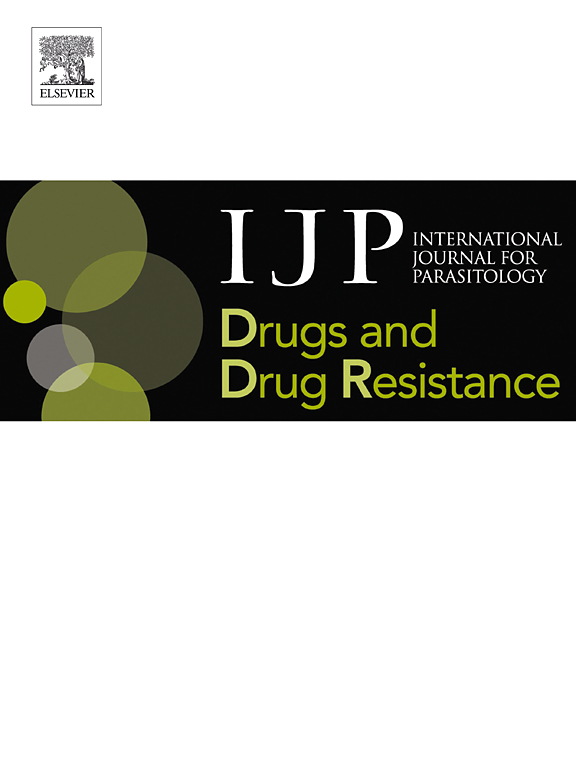gdSir2.1和gdSir2.3通过调控氧化应激反应参与十二指肠贾第虫对阿苯达唑的耐药性
IF 3.4
2区 医学
Q1 PARASITOLOGY
International Journal for Parasitology: Drugs and Drug Resistance
Pub Date : 2025-05-05
DOI:10.1016/j.ijpddr.2025.100596
引用次数: 0
摘要
十二指肠贾第虫对阿苯达唑的耐药性包括一个复杂的多因素挑战,可能涉及未报道的途径,如代谢调节因子的参与。在这种情况下,sirtuins,在各种细胞过程中被称为代谢传感器,已经成为新型抗寄生虫治疗的有希望的候选者。为了探讨sirtuins在阿苯达唑(ABZ)耐药性中的作用,我们首先分析了实验室获得的3株对阿苯达唑(ABZ) 8 μM、1.5 μM和250 μM耐药的贾第鞭虫菌株sirtuins的表达情况。此外,我们使用基于crispr的敲低策略来抑制贾第鞭虫中的几种sirtuins,并分析了sirtuins对ABZ耐药性的影响。我们的研究结果表明,在三种不同的阿苯达唑耐药品系中,sirtuins gdSir2.1、gdSir2.2和gdSir2.3显著上调。gdSir2.1和gdSir2.3的敲低导致寄生虫对阿苯达唑和过氧化氢的敏感性升高。此外,我们的研究表明sirtuins有助于调节寄生虫体内的活性氧(ROS)水平、氧化DNA损伤和氧化应激反应(OSR)基因的表达。总之,我们的研究结果表明,gdSir2.1和gdSir2.3主要通过调节氧化应激反应在介导阿苯达唑抗性中发挥重要作用。本文章由计算机程序翻译,如有差异,请以英文原文为准。

gdSir2.1 and gdSir2.3 are involved in albendazole resistance in Giardia duodenalis via regulation of the oxidative stress response
Albendazole resistance in Giardia duodenalis includes a complex and multifactorial challenge that potentially involves non-reported pathways such as the participation of metabolic regulators. In this context, sirtuins, known as metabolic sensors in various cellular processes, have emerged as promising candidates for novel anti-parasitic treatments. To investigate their role in albendazole (ABZ) resistance, initially we analyzed the expression of sirtuins in three Giardia strains resistant to 8 μM, 1.5 μM and 250 μM of ABZ that were obtained in our laboratory. Additionally, we used a CRISPRi-based knockdownstrategy to repress several sirtuins in Giardia and analyzed the effect of sirtuins on ABZ resistance. Our findings demonstrated a significant upregulation of sirtuins gdSir2.1, gdSir2.2 and gdSir2.3 in the three distinct albendazole-resistant lines. Knockdown of gdSir2.1 and gdSir2.3 resulted in heightened parasite susceptibility to both albendazole and hydrogen peroxide. Further, our study suggested that sirtuins contribute to the regulation of reactive oxygen species (ROS) levels, oxidative DNA damage, and the expression of oxidative stress response (OSR) genes within the parasite. Collectively, our results demonstrated that gdSir2.1 and gdSir2.3 play a significant role in mediating albendazole resistance, primarily through regulating the oxidative stress response.
求助全文
通过发布文献求助,成功后即可免费获取论文全文。
去求助
来源期刊

International Journal for Parasitology: Drugs and Drug Resistance
PARASITOLOGY-PHARMACOLOGY & PHARMACY
CiteScore
7.90
自引率
7.50%
发文量
31
审稿时长
48 days
期刊介绍:
The International Journal for Parasitology – Drugs and Drug Resistance is one of a series of specialist, open access journals launched by the International Journal for Parasitology. It publishes the results of original research in the area of anti-parasite drug identification, development and evaluation, and parasite drug resistance. The journal also covers research into natural products as anti-parasitic agents, and bioactive parasite products. Studies can be aimed at unicellular or multicellular parasites of human or veterinary importance.
 求助内容:
求助内容: 应助结果提醒方式:
应助结果提醒方式:


